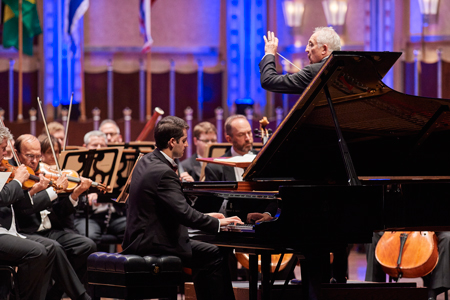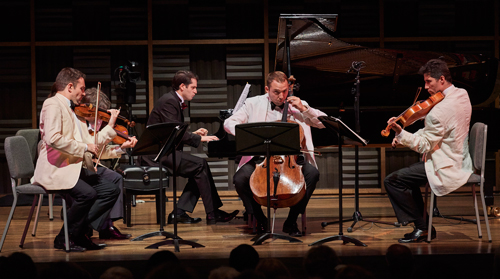by Daniel Hathaway

Mndoyants will play his first area post-competition recital on the Music From The Western Reserve Series on Sunday, October 16 at 5:00 pm in Christ Episcopal Church in Hudson. The program includes works that helped him rise to the top of the Cleveland competition: Joseph Haydn’s Sonata in E, Hob. XVI:31, Franz Schubert’s Sonata No. 19 in c, and Sergei Prokofiev’s Sonata No. 7 in B-flat, Op. 83, “Stalingrad.”
We reached Mndoyants via Skype at his home in Moscow and began by asking him how his life has changed since winning the Cleveland competition.
Nikita Mndoyants: It’s changed a lot in a very good way. I have a lot of future engagements not only in the States, but in Europe and in my homeland. My winning in Cleveland was important news in Russia, and may have a great influence on Russian presenters.
DH: Did you enjoy your experience in Cleveland?
NM: The event was really exciting because it felt more like a festival than a competition. The environment was great and the atmosphere was very bright, with much less of a feeling of pressure than usual. That helps very much.
DH: Your Hudson program features works you performed during the rounds in Cleveland.
NM: They’re among my favorites, and coming so soon after the competition, they’re also in good condition.
DH: Then you’ll be returning again to Northeast Ohio later this season.
NM: Yes, I’ll be playing with the Canton Symphony and the Firelands Symphony in February, and returning to Cleveland in May for a preview of my New York recital, which takes place in Weill Hall at Carnegie Hall on June 7.
DH: For your Canton performance, you’re going to play Prokofiev’s Second Concerto.
NM: It’s one of my favorites, complex in orchestration and form. It’s very dramatic in comparison with his other concertos, which are beautiful but lighter and more written for effect. The second is his deepest piano work, and a very important one because he wrote it before he left Russia for his big European and American journey. Every time I listen to it, I hear something new.
DH: And what will you play with the Firelands Symphony?
NM: Beethoven’s fourth.
DH: That’s the piece that both you and the 2011 winner, Alexander Schimpf, played for your final rounds with The Cleveland Orchestra. Why did you choose that work over a flashier piece?
NM: It’s also one of my favorites, but for another reason. It’s really lyrical, and when I play it I just enjoy what I’m doing. I played it several times before Cleveland, and felt really free. I thought it was probably better to choose a piece that allowed me to share that freedom and show my enjoyment of the music. That helped me play under the best conditions.

NM: In the fall of 2015, I played a little tour in the Southwest, and ended up in Tucson. I decided to play my own piece for an encore, a simple thing I had just composed. A man came up afterward and said he was the head of the chamber music society’s commissioning program and proposed that I write a piano quintet to play with any quartet I liked. I’ve played a lot in France with the Zemlinsky Quartet, who by chance were planning a tour to the US, so we were able to arrange a concert last November in Tucson. Everything just came together. I never thought that a little encore could provoke such a beautiful result.
DH: Were you able to take some time off to relax after the Cleveland Competition?
NM: No — I immediately went to France for three weeks to play with my friends at a chamber music festival and give the French premiere of the Tucson piece. When I play music, I feel in a very comfortable environment. It’s not something that makes me exhausted.
Photos of Nikita Mndoyants with Bramwell Tovey and The Cleveland Orchestra, and with the Escher String Quartet during the CIPC chamber music round, by Roger Mastroianni.
Published on ClevelandClassical.com October 11, 2016.
Click here for a printable copy of this article


